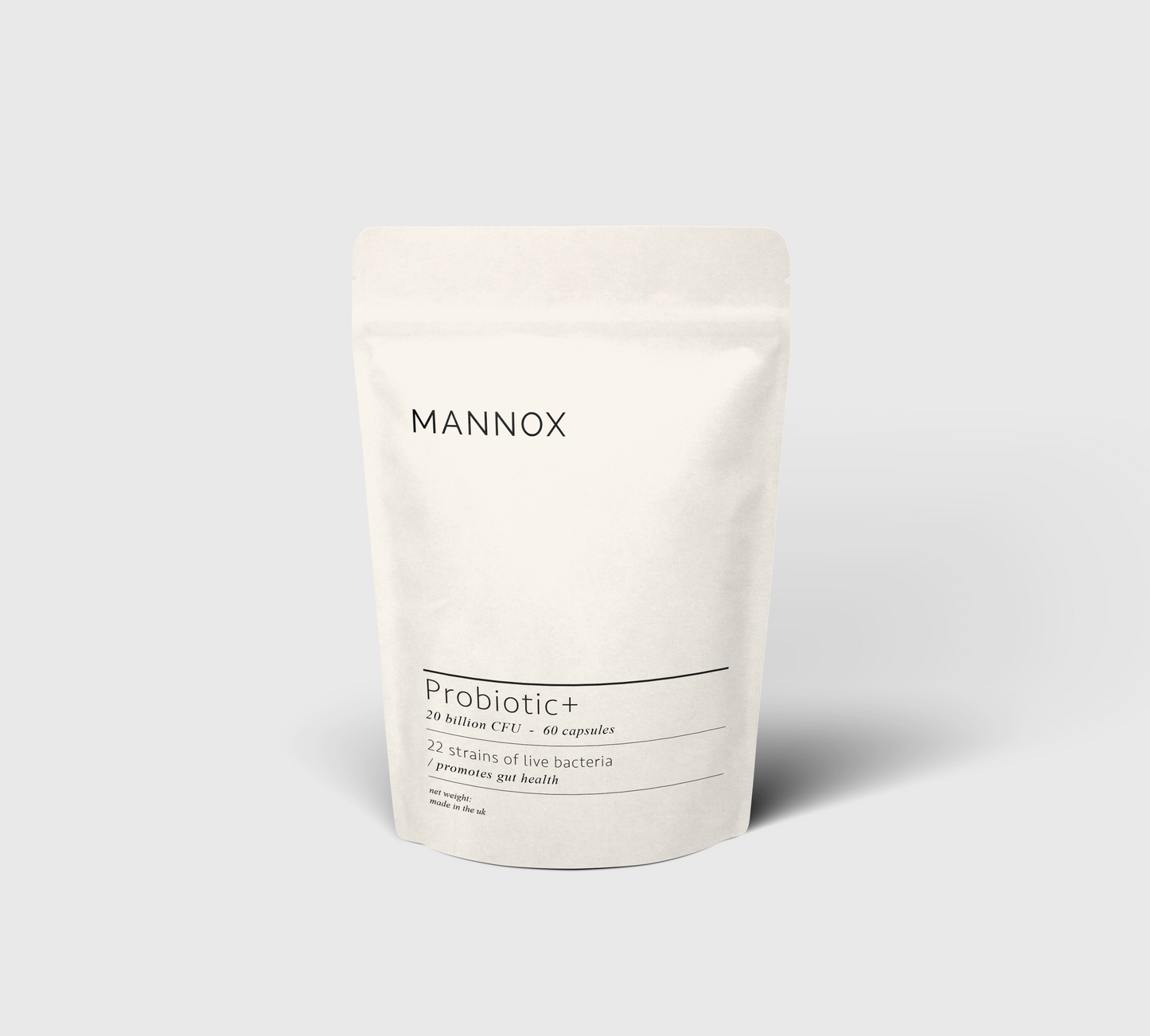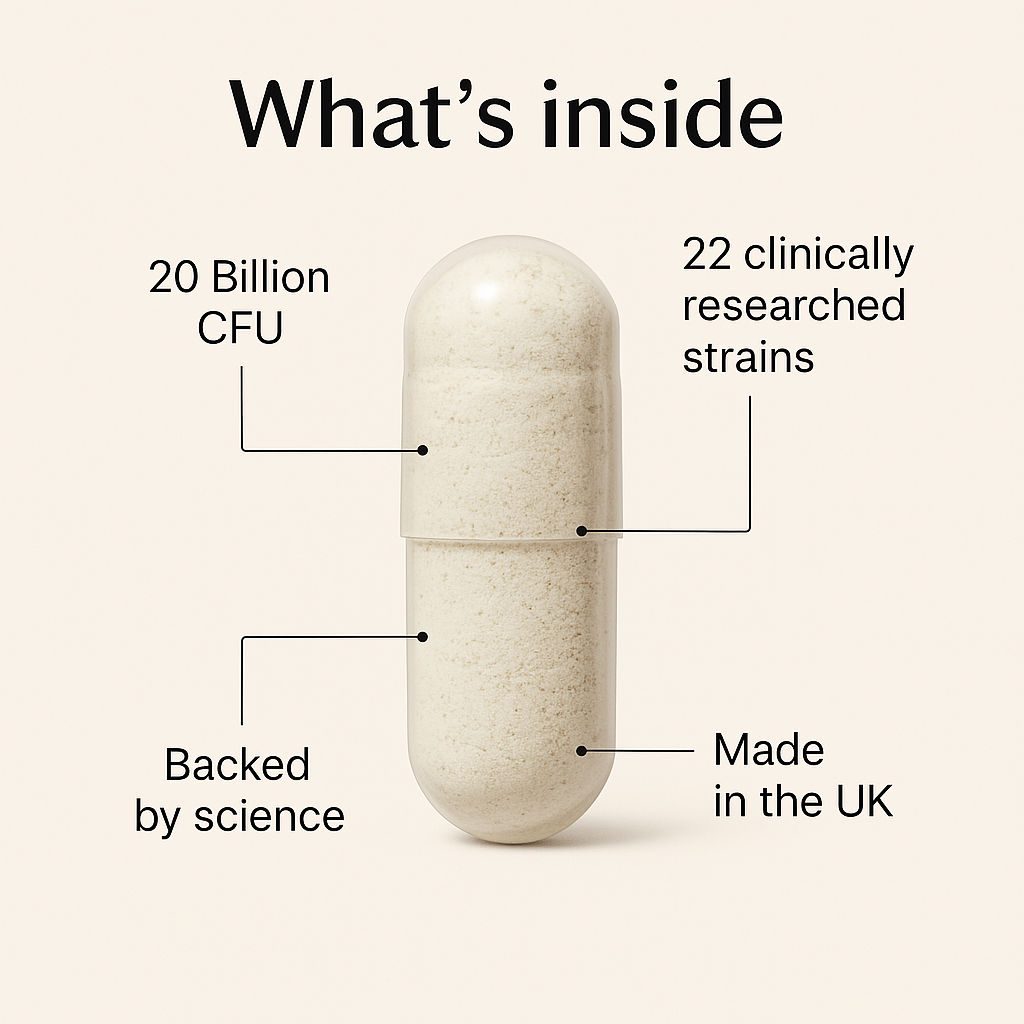Probiotic+
Probiotic+
- Restore gut bacteria
- Target bloating and discomfort
- Promote gut-brain axis
Restore balance and ease discomfort.
Containing 22 strains of highly researched live bacteria to promote gut health.
20 billion CFU per capsule to ensure effective dosing.
60 capsules. Take 2 capsules per day.
For best results, continue for at least 3 months.
Couldn't load pickup availability
How to take
How to take
Take 1-2 capsules daily, with or without food.
Do not exceed recommended doses.
Store in a cool dry place - perhaps in a pill box to help you remember?
Ingredients
Ingredients
Live bacterial strains
Lactobacillus (14 strains): L. acidophilus, L. reuteri, L. helveticus, L. crispatus, L. fermentum, L. rhamnosus, L. gasseri, L. plantarum, L. casei, L. paracasei, L. salivarius , L. jensenii, L. delbrueckii subsp.bulgaricus, L. delbrueckii
Bifidobacterium (6 strains): B. coagulans, B. lactis, B. longum, B. bifidum, B. infantis, B. animalis
Streptococcus thermophilus
Enterococcus faecium
Bulking agent: Brown rice flour
Vegan and allergen free
Subscription benefits:
- Free UK shipping
- Skip or cancel any time
- 100% recyclable packaging


The Power of Probiotic+
Each capsule contains billions of live active cultures of beneficial bacteria

Nurture your microbiome
Probiotic+ capsules are packed with 22 strains of science-backed strains specifically chosen to support a healthy gut microbiome, at a dose guaranteed to reach there.
Healthy gut, healthy you
Your microbiome has effects well beyond the gut too

Digestive health
Probiotic+ supports a healthy gut microbiome - reducing bloating, discomfort, and irregular bowel movements

Boost your immunity
A thriving gut microbiome supports your body's natural defences and protect against infection

Mental well-being
The gut plays a surprising role in our mental performance.
This connection is facilitated by the gut-brain axis, a complex network of communication between the trillions of bacteria residing in our gut (microbiome) and the central nervous system.
I’ve been taking probiotics for a while, but this one is the best I’ve tried. I feel more energized and my stomach feels more balanced. Definitely cheaper than some others too
I’ve been taking it for about 10 days, and I feel a little better, but it’s not a huge change yet. I’ll give it more time.
I’ve been using this for a couple of weeks now, and I’ve noticed less bloating after meals. Definitely recommend!
Meet the microbes
The Science Behind Probiotic+
Gut Health
Gut health impacts us all on a daily basis, and symptoms like abdominal pain, bloating, constipation and diarrhoea can seriously interfere with usual life.
In the absence of more serious diseases, such symptoms are often grouped under the banner of IBS, and thankfully there have been many high quality studies assessing the effects of probiotics in IBS.
The difficulty in studying probiotics comes from the sheer variety of bacterial strains available, which makes extrapolating outcomes more difficult.
Despite this, some specific probiotic strains are showing promising results in high-quality studies
- This meta-analysis examined 43 Randomised-Control Trials (RCTs) with 5,531 IBS patients. They found that the strain B.coagulans had the highest efficacy in improving symptoms, followed by L. plantarum
- This meta-analysis of 53 RCTs involving 5545 participants with IBS found that combination probiotics were beneficial in reducing the IBS symptoms and abdominal pain
Overall many of the trials done to date suffer from short time frames and a lack of uniformity in terms of bacterial strains being tested. Further high quality RCTs are currently ongoing in this area.
Probiotic+ contains a blend of 22 different live bacterial strains, including both B. coagulans and L. plantarum.
Lactose Intolerance
Introducing bacteria that produce lactase, the enzyme that breaks down lactose, has the potential to aid lactose digestion.
- This meta-analysis of 15 RCTs found a positive effect of probiotics on lactose intolerance, although results were variable.
- This RCT studied the effect of a specific strain of Lactobacillus acidophilus, and found that it was improved diarrhoea and abdominal cramping after a lactose challenge.
Probiotic+ contains Lactobacillus acidophilus, amongst several other Lactobacillus strains.
Mood and the Gut-Brain Axis
The gut isn't just responsible for digestion and nutrient absorption – it also plays a surprising role in our mental well-being. This connection is facilitated by the gut-brain axis, a complex network of communication between the trillions of bacteria residing in our gut (microbiome) and the central nervous system.
Emerging research suggests a two-way street: the gut microbiome can influence mood, and stress and emotions can impact gut health.
- This review in Nature from 2020 explored the numerous exciting avenues of research into the gut microbiota-brain axis and it's possible links to mood (anxiety, depression) as well as degenerative disorders (Alzheimers, Parkinson's Disease) and even neurodevelopmental disorders like autism spectrum disorder.
- This meta-analysis of 34 RCTs showed a small but significant benefit of taking probiotics in depression and anxiety, although the studies were mostly small and of variable quality.
These reviews showcase the growing body of evidence suggesting a link between the gut microbiome and mood.
While the exact mechanisms are still being unraveled, understanding the gut-brain axis has opened exciting possibilities for managing mental health through dietary and probiotic interventions.
Cautions
Probiotics are generally safe with few contraindications.
However, the NHS advises that if you have an existing health condition or a weakened immune system, you should talk to a doctor before taking any probiotic supplements.




